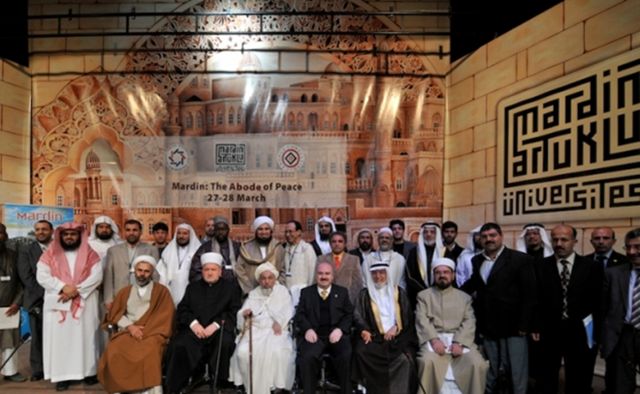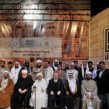
Anwar al-Awlaki Attacks Mardin Conference’s Declaration on Jihad
Publication: Terrorism Monitor Volume: 8 Issue: 42
By:

Salafi-Jihadist ideologue Anwar al-Awlaki has penned an emotive response to a declaration by Islamic scholars who challenge the theological basis for the violent jihad of al-Qaeda and its associates. In a lengthy essay published in the second issue of the English-language Jihadist magazine Inspire, al-Awlaki criticizes a statement issued at a conference held in Mardin, Turkey, in March at which an international panel of Muslim clerics and scholars reinterpreted a 14th century fatwa that forms a cornerstone of the contemporary Salafi-Jihadist movement’s theological justification for violent jihad. [1]
The conference was convened to re-examine the fatwa originally issued in Mardin by Shaykh Taqi al-Din ibn Taymiyah (1263-1328). This important fatwa attempted to legitimize jihad against nominally Muslim governments whom Ibn Taymiyah deemed insufficiently Islamic. [2] The fatwa has since been appropriated by Salafi-Jihadists to underwrite violence against governments in the Muslim world.
The so-called “New Mardin Declaration” argued that Ibn Taymiyah’s original fatwa was a product of specific circumstances, when the Mamluk sultanate of Syria and Egypt was under constant threat of invasion by Mongol armies who claimed conversion to Islam. However, the scholars suggested that contemporary circumstances are now so different to those in which Ibn Taymiyah issued his fatwa that its modern use by al-Qaeda as a justification for violent jihad is completely illegitimate: “Muslims are now bound by international treaties through which security and peace have been achieved for the entire humanity, and in which they enjoy safety and security, with respect to their property, integrity and homelands.”
In his essay “The New Mardin Declaration: An Attempt at Justifying a New World Order,” al-Awlaki attempts to discredit this viewpoint with a stinging attack on both the scholars behind the declaration and their motives.
Justifying a New World Order?
Al-Awlaki first and foremost asks his readers to question the motives of the Mardin scholars and the interests their declaration really serve. Rather than a recalibration of juristic consensus on a single issue, he claims the declaration is “a thorough revision of usul (Islamic foundations) based on a new world order agenda.”
In this respect he adopts a position similar to that of other jihadist ideologues by trying to characterize the panel members as scholars of baatil (falsehood) waging ideological warfare on the jihadist movement by using religious arguments in a bid to undercut its perceived legitimacy. Why, he argues, would such scholars preach what appears to be a doctrine of non-violence at a time when the Muslim world faces such calamities? Why would they promote pacifism in the face of overwhelming evidence of a global military and ideological “crusade” being waged against the Muslim ummah (community) by the United States and friendly regimes in the Muslim world?
Al-Awlaki thus attempts to delegitimize the Mardin Declaration by weaving it into a conspiracy theory framework in which the United States and its allies are attempting to stifle a global Islamic awakening by promoting alternative “pacifist” and “pro-regime” forms of Islam. The West’s supposed ideological war on Islam is a theme explored repeatedly by al-Awlaki and his English-speaking contemporaries in writings and lectures. The ideological war, he argues, is potentially more damaging to the future of Islam and the ummah than military occupation of Muslim land, as it represents a strategic effort by the West to turn the youth away from an understanding of their true obligations to defend their religion. Apostate regimes and compliant scholars such as those behind the Mardin Declaration are, according to al-Awlaki, an attempt to put a credible face on a U.S.-led attempt to spread a watered-down “CIA Islam” and thus ideologically smother the jihadist movement. Al-Awlaki’s essay is an attempt to “expose” the reality of this campaign. According to al-Awlaki, “We are living in a time when the West has publicly stated that it will use Muslim against Muslim in the battlefield and will use scholar against scholar in the battle for the hearts and minds of the Muslim ummah.”
So Much for Human Rights
Al-Awlaki does not make any significant attempts to engage the Mardin scholars at the juridical level. Rather, he appeals to the reader to consider the text of the Declaration in light of current events in the Muslim world. In doing so he powerfully highlights what some Muslims may regard as the disconnect between the human cost of the ongoing conflicts in countries such as Afghanistan, Iraq, and the Palestinian Territories, and the Declaration’s assertion that Muslim lives, wealth and property are now largely protected under international law. Such a declaration, al-Awlaki argues, is clearly divorced from reality and therefore an irrelevance:
"Are Muslims enjoying security and peace? Or they don’t really matter as long as Western societies are the ones enjoying it? Are these scholars following the news? If they think that they are enjoying peace and security, the majority of the ummah think otherwise… [The declaration] is an insolent statement that shows no respect to the sufferings of our ummah. It is a slap on the face of the Palestinian widow and the Afghan orphan. It is disrespectful towards the millions of Muslims around the globe who are suffering because of the international community which these scholars are crediting for bringing so much ‘security and peace.’"
Al-Awlaki is particularly scornful of the Declaration’s assertion that the emergence of civil states has safeguarded the “religious, ethnic and national rights” of millions of people, Muslims included. Al-Awlaki again seeks to juxtapose this statement with examples of what he claims are transgressions of “Islamic rights” by Western governments. “The civil states referred to here have banned the niqab and fiercely defended the right to defame Muhammad,” he says, adding:
"They allow a very restricted form of personal worship that does not truly accommodate for the comprehensiveness of Islamic practice. The civil state has more authority over the wife and children than the Muslim head of the household. The law of Allah is not recognized by this civil state and the Muslim is forced to accept rulings of courts of law that are contrary to the law of Allah. So, on the whole, the modern civil state of the West does not guarantee Islamic rights."
Al-Awlaki also suggests to his readers that supporting the international treaties cited by the Mardin Declaration represents a fundamental sin for Muslims. To believe in legislation and systems of governance other than that enjoined by God is to commit major shirk (polytheism), he says, which can take a Muslim outside the fold of Islam. Therefore, he argues, these treaties are irrelevant to Muslims and should be ignored. In any case, he adds, the international organizations that formulated them have a less than impressive track record of protecting Muslim lives.
The Evil of “Interfaith Relations”
Al-Awlaki uses simple religious arguments and references to early Islamic history to challenge the call by the Mardin scholars for peaceful co-existence with other faiths. This position, he claims, cannot be supported with even a shred of historical evidence. He uses selective references to the Quran to underscore his argument that the Prophet Muhammad and the Muslim leaders in early Islamic history in fact fought their non-Muslim enemies purely on the basis that they were non-Muslim and that it was their obligation to fight other faiths until Islam gained total supremacy.
Therefore, he says, instead of working to promote Islamic monotheism and make Allah’s word supreme, “palace scholars” such as those on the Mardin panel are allowing Islam to be subjugated by kowtowing to the demand of the United States that Islam exist peacefully alongside other faiths:
"The pagans of Arabia were fought because they were pagans, the Persians were fought because they were Zoroastrians and the Romans were fought because they were Christians. The great Muslim Sultan Mahmud Sabaktakeen [i.e. Mahmud Ghaznawi; a.k.a. Mahmud Ibn Sebuk Tegin, 997-1010] fought against the Hindus because they were Hindus and he personally led his army in a risky campaign deep into the land of India with the sole objective of destroying the most revered idol in all of India. He was fighting because of this “difference of religion” our esteemed scholars of Mardin are discounting."
Conclusion
Al-Awlaki’s critique of the Mardin Declaration could be seen as an example of why he is such an effective communicator. Put simply, he knows his audience – largely a minority of young English-speaking Muslims in the West – and pitches his arguments at a level that is simple, emotive, and compelling. He directly addresses the issues of concern to many young Western Muslims experiencing a growing religiosity and concern about the plight of their co-religionists abroad. By comparison, as al-Awlaki himself puts it, rival “establishment” scholars use what he calls “the language of lawyers and peace activists” to offer nothing more than calls for non-violence and interfaith dialogue, while condemning their fellow Muslims’ use of force to defend themselves and their religion. Al-Awlaki poses another simple question – if the jihad is not legitimate now, while the Muslim world is under such sustained attack, then when is it legitimate?
Al-Awlaki’s essay is an impassioned critique of the Mardin Declaration, not a theological refutation. That is not to say that al-Awlaki does not attempt to support his arguments with references to Islamic doctrine. However, these references are concise and accessible, and he never allows the clarity of his message to become lost amid overly detailed, introspective debate on the finer (though by no means unimportant) points of Islamic jurisprudence. While the publication of tracts at the more detailed juridical level is undoubtedly important in shoring up perceived theological top-cover for Jihadist violence, al-Awlaki possibly knows that much of this screed may be lost on a good proportion of his audience who may possess only modest levels of scriptural knowledge. Al-Awlaki focuses instead on highlighting those issues he knows will provoke a sense of widespread moral outrage among Muslims, such as the human cost of ongoing conflict in Afghanistan, Iraq, the Palestinian Territories, and elsewhere.
In the bigger picture, it is interesting that al-Awlaki has bothered to pen such an extensive rebuttal of the Mardin Declaration at all. While initially deriding such pronouncements and their authors as being at best irrelevant and at worst sell-outs to the jihadist cause, jihadist scholars nevertheless seem compelled to respond with exhaustive criticism and theological refutations, which may be a reflection of a perceived strategic vulnerability. The publication in 2007 of extensive recantations by leading Egyptian jihadist ideologue Sayyid Imam al-Sharif (a.k.a. Dr. Fadl) is one of the most compelling examples of how such critiques have the power to tie down al-Qaeda ideologues in high-profile scholarly debate. If sustained, such critiques have the potential to damage the credibility of the jihadist narrative and the theological undercarriage that supports it. An interesting problem for Western counterterrorism agencies and officials involved in counter-radicalization programs is the extent to which they could or should find ways to amplify or selectively redeploy excerpts of these recantations to maximize their effectiveness against the jihadist adversary.
Notes:
1. Inspire was released by AQAP’s al-Malahim Media in October 2010. A full PDF copy of the magazine can be found at https://publicintelligence.net/complete-inspire-al-qaeda-in-the-arabian-peninsula-magazine-issue-2-fall-2010/.
2. For background on the original Fatwa and a report on the Mardin conference, see Andrew McGregor, “Controversial Gathering of Scholars Refutes al-Qaeda’s Ideological Cornerstone,” Terrorism Monitor Briefs, April 9, 2010.





